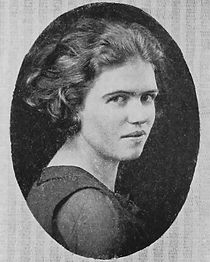
Making connections across science and society since 1877
Our Purpose
Vision
A forum for anthropological inquiry about issues that matter to science and society.
Mission
We bring together creative thinkers to explore connections across society, science, community, and culture.


Our History
_2.jpg)
Margaret Mead
Since 1877, the Anthropology Section of the New York Academy of Sciences (NYAS) has served as a meeting place for scholars from across the four fields of anthropology. Prominent anthropologists including Franz Boas, Ruth Benedict, and Margaret Mead have been pivotal leaders in the organization.
The Anthropology Section has a long history of serving as a forum for public discussion and debate about what it means to be human. Today, with support from our partners, the Anthropology Section hosts free programming during the academic year that engages scholars, students, and a broader public in the exploration of topics related to anthropology. Our main event offering is the Distinguished Lecture Series (DLS).
A volunteer advisory board of New York area anthropologists plans each year’s events: lecture series, workshops, networking meetups, and conferences. These events focus on contemporary issues and debates about humans and the societies in which they live.
We operate as an open community rather than a membership organization. All events are open to the public and most are free. We welcome anyone curious about anthropology.

Franz Boas

Ruth Benedict
Our Programming
The Distinguished Lecture Series (DLS), our primary event offering, builds on a 100-year history of science-for-the-people by offering free public lectures which examine anthropology’s contributions to pressing issues of the day. While even the concept of “the public” is endangered these days, the goal of this series is to maintain domains for public discussion and debate.
Our lectures are places where people—academics, students, professionals from other disciplines, and interested members of the public—actually meet one another and exchange ideas.
With the generous support of our partner organizations, we have resisted charging admission for lectures. Instead we are building a face-to-face participatory audience seeking answers about what it means to be human and how anthropological understanding of the human is part of the struggle for global social justice.
We ask our lecturers to address these broad themes through the lens of their own research.
Our Partners
We're grateful for the generous support of organizations that share our commitment to anthropology:
The New York Academy of Sciences brings together a global community of scientists, science-enthusiasts, and leaders in industry, academia, and the public sector.
Berghahn Books publishes leading-edge anthropological scholarship for global audiences, ensuring that groundbreaking research reaches both the academic and public spheres.
Wenner-Gren Foundation helps anthropologists advance anthropological knowledge, build sustainable careers, and amplify the impact of anthropology within the wider world.
Christine Hegel-Cantarella (Chair)
Western Connecticut State University
Kristina Baines
Guttman College, CUNY
Siobhan Cully
Rutgers University
Ryan Raaum
Lehman College, CUNY
Stephanie Rupp
Lehman College, CUNY
Hylke De Jong (Treasurer)
Rutgers University
Marion Berghahn
Berghahn Books
Veronica Davidov
Pilar Rau
Rutgers University
Betty Wolder-Levin
Patricia Antoniello
Shahrina Chowdhury
Brooklyn College, CUNY
Louise Lamphere
Matthew Reilly
The Graduate Center, CUNY
